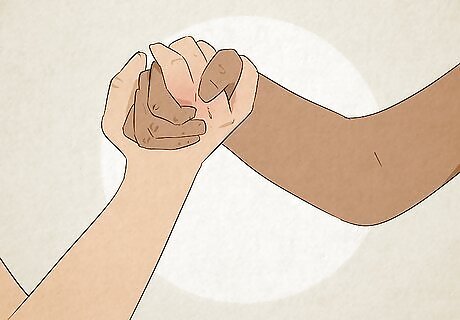
views
X
Trustworthy Source
Mayo Clinic
Educational website from one of the world's leading hospitals
Go to source
That said, if you’ve been hurt by someone who exhibits manipulative or toxic behavior (regardless of whether they have clinical NPD or not), there are ways to get them off your back and show them their behavior just isn’t OK. We’ll walk you through psychology-backed ways to show a toxic person that they can’t bother you anymore.
- Show a toxic or manipulative person they don’t have power over you by confronting them about their mistakes, especially in front of witnesses.
- Set boundaries and stop agreeing to their requests and demands. If the person in your life is abusive, cut them off entirely if you can.
- In the end, the best revenge is living well, so do your best to move on from the pain this person has caused you and take good care of yourself.
Acknowledge their mistakes.

Some people can dish criticism, but they have a hard time taking it. If this person has an inflated ego, any small negative comparison or critique will cut them to their core. We’re not advising going out of your way to insult them for the fun of it, but when they make a mistake—especially one that affects you—don’t beat around the bush to protect their ego. Point out their bad behavior or let them know when they’ve gotten something wrong to remind them they’re not perfect. You don’t have to be mean, pointed, or sassy when you deliver your criticism. Keep an even and polite tone like you would for anyone else—they’ll still be irritated by it. Prepare for them to lash out to defend themselves. They may try to criticize you back or blame their shortcomings on something else.
Take authority away from them.

Manipulative or toxic people often feel safest when they’re in control. They need constant validation and approval, and they fear strong individuals and authority figures because they’re the ones that can give (or not give) it to them. Take control of your interactions with this person and be assertive, make strong eye contact, and speak with a steady, unwavering voice. People who stand up for themselves make controlling people truly miserable. It can be intimidating to stand up to a controlling person, but you’re more likely to gain their respect when you fill the role of a superior rather than an equal. For extra impact, position yourself as a leader on a team at work, in a group project, or on a sports team or planning committee. Your status will intimidate and aggravate this person.
Say “no.”

Some people expect you to do whatever they want, whenever they want. They think everything revolves around them and are absolutely floored when someone sticks up for themselves and tells them “no.” Stay calm and deny their ludicrous requests for special treatment or favors. They’ll try to change your mind, so stay persistent. They will feel less powerful when you don’t yield to them. For example, say “no” when they tell you to run an errand for them to empower yourself and draw a boundary around what you’re willing to do.
Go “no contact.”

People who crave attention panic when you stop giving it to them. They’ll never understand why someone would ignore or reject them because in their mind, they’re flawless. Don’t answer their calls, texts, or DMs, and avoid interacting with or speaking to them in public when possible. They’ll feel defeated when they realize they can’t trigger an emotional response out of you whenever they want. When you ignore them, they may try to reach out to you excessively. It might be satisfying to watch them flounder at first, but their messages will turn uglier and more hurtful the longer you hold out. If your goal is to break off your relationship with this person entirely, this is the best route to go.
Expose their behavior.

Shattering their public image may make them behave better. If this person tends to lie or gaslight you in front of others, call them out. Say, “You’ll do anything to make yourself seem right.” When they lie again to defend themselves, call them out again (“See? You’re doing it again.”). Show evidence in the form of texts or emails if you can so they don't get away with lying. You may feel guilty, but standing up for yourself and focusing on the facts—not their version of reality—isn’t mean. It’s possible this person will feel humiliated and try to humiliate you back. Be prepared for insults and false claims about your character or actions.
Succeed in areas they want to dominate.

Some people fear direct competition because of their need to be the best. That’s partly why they work so hard to tear people down—they want others to feel less competent, less capable, less skilled, or less valuable than them. Refuse to let them intimidate you and shut them down by outperforming them in something they value highly. At work, this could be something like selling more products than them, earning a promotion over them, or becoming employee of the month. In school, this might look like earning higher grades, being elected leader of a club they’re in, or cultivating a good relationship with a teacher they like. In your personal or social life, you can network with more influential people, grow a larger social media following, or build stronger relationships than them.
Trick them into doing you a favor.

Some people will do anything if they think it will benefit them. People with an inflated ego often want to cultivate a positive image so other people will think highly of them. You can get an egotistical person to do you a favor by explaining how the task will make them look good or telling them they’re the best person for the job. They’ll go along with it to earn praise and validation (and they’ll probably convince themselves it was their idea in the first place, too). Try phrasing your requests like: “The boss will be so impressed with you if you can cover my shift this weekend.” “Can you help decorate for the gala? You just have an eye for design that no one else has.” “You’ll be an absolute hero if you can pick me up from the airport next week!”
Beat them at a game.

If they “need” to be the best, losing is sure to humble them. Show them they’re not invincible by beating them in a video game, board game, or some other challenge. Some people just don’t like to be confronted with the fact that they’re not the best at everything. They may try to justify their loss by claiming you cheated or that the game was otherwise unfair.
Avoid giving them an emotional reaction.

They’ll leave you alone if they can’t get you emotionally riled up. You can get a manipulative or energy-draining person off your back by “gray rocking”—refusing to react to anything they do or say. Act as boring, uninteresting, and mild-mannered as possible. They’ll get bored and irritated when they realize you have nothing to offer them and that they can’t get a rise out of you. Some toxic folks like to stir up drama for fun or because they want emotional reactions or personal information to use against you later. If they can’t get these, they’ll leave you alone.
Forgive and forget.

The best revenge is living well. Your happiness and success are the ultimate revenge. Feeling good about yourself is the antidote to someone whose goal was to control you and bring you down. Forgive this person for their behavior—and move on. Even if they don’t suffer consequences for hurting you, it helps you release the negativity they’ve created and forget about them. Instead of worrying about getting revenge on this person, focus on your goals, dreams, and personal fulfillment. Doesn’t it feel better not to care what this person thinks?
Focus on self-care.

Some people want to damage your self-esteem so they can control you. They inflict emotional and psychological trauma to use you and maintain influence over you. These wounds can last far longer than your relationship with this person, so even if you’ve cut off contact with them, you may still need to recover, heal, and grow. Focus on self-care tactics like: Practicing gratitude for the good things in your life may help you heal from the wounds this person inflicted. Take care of your physical health with good sleep, nutrition, and exercise. Do breathing exercises and meditate to clear your mind and calm your body. Seek support from your friends and family, and consider seeing a therapist or counselor to help you navigate your experiences and move on.



















Comments
0 comment